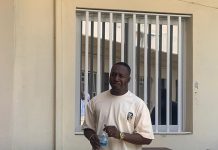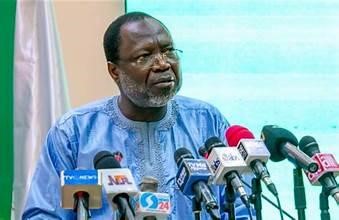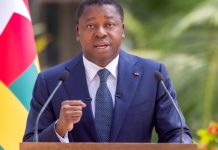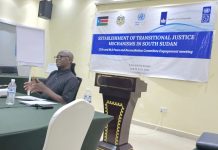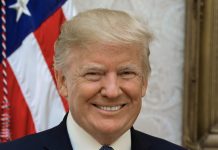By Kebba AF Touray
The President of the Commission of the Economic Community of West African States (ECOWAS), Dr. Omar Alieu Touray, said inflation in Sub-Saharan Africa is projected to decline to 13.3 percent in 2025.
Dr. Touray said the statement while presenting the State of the Community’s Interim report before members of the ECOWAS Parliament on Saturday, 31 May 2025, during the just concluded First Ordinary Session of the Regional Parliament in Abuja, Nigeria.
The Interim Report on the State of the Community presents a performance of the community’s work programs against the background of the global and regional macro-economic, political and security situations, which impact the performance of the Commission’s institutions during the first half of the financial year.
On International, Continental and Regional Economic Outlook:
Dr. Touray, in his report before members of the Regional Parliament, said global growth is expected to slow to 2.8 percent in 2025, compared to 3.3 percent in 2024, before picking up slightly to 3.0 percent in 2026.
He, however, said that global inflationary pressures continue to ease in 2025 from 5.7 percent in 2024, to 4.3 percent, noting that this downward trend is evident in all regions, particularly in emerging and developing economies, where inflation is projected to decline to 4.6 percent in 2025, compared to 5.5 percent in 2024.
In sub-Saharan Africa, inflation is projected to decline significantly from 18.3 percent in 2024 to 13.3 percent in 2025. He indicated that the economic outlook in Africa is projected at 4.0 percent in 2024 from 3.6 percent in 2023, which was driven by growth in all regions except Central Africa, where significant deceleration in growth in 2025 is expected to be experienced.
“Equally, inflation is expected to decline to 12.8 percent in 2025, compared to 18.4 percent in 2024, and will decline further to 11.5 percent in 2026,” Dr. Touray said; that an ease in inflationary pressures is linked to the tightening of monetary policies that is supported by a decline in food and energy prices. He said budget deficits continue to worsen, rising from 4.1 percent in 2023, to 5.1 percent in 2024 and 6.0 percent in 2025.
“The worsening deficit in 2025 is attributable to the deteriorating security situation in the region and a decline in commodity prices. However, the debt ratio is expected to stabilise at 65 percent of GDP in 2025, as in 2024,” Dr. Touray said.
On the political and security context for the Region:
Dr. Touray said the political and security context of the region is also marked by the effective withdrawal of Burkina Faso, Mali and Niger from ECOWAS, though the initial tensions generated by their withdrawal is waning down, giving way to a more constructive engagement.
“However, activities of terrorists and armed groups have intensified, with repeated attacks against security forces in the northern part of Benin Republic; the resurgence of Boko Haram in the northeastern part of Nigeria, and the advent of the ‘Lakurawa’ armed groups, disrupting lives and livelihoods in the northwestern part of Nigeria,” Dr. Touray decried. He continued that geopolitical tensions have also continued with the persistence of the war between Russia and Ukraine, and the US imposition of tariffs and deportation of migrant communities, which threatens many economies.
Shifting deliberations on the implementation of community programs, Dr. Touray revealed that some notable results have been achieved in the areas of regional stability, security and governance, when it comes to the implementation of community work programs.
On Regional Stability, Security and Governance Program:
On the above issues, Dr. Touray said the key regional issues that dominate the attention of the Community during the period are the political situation of member states (notably Guinea Bissau and Liberia), and the uncertainties accompanying the effective withdrawal of Burkina Faso, Mali, and Niger from ECOWAS.
He said the Commission deployed a high-level political mission to Guinea-Bissau from 21 to 28 February 2025, to support the efforts of political actors and stakeholders in that country towards a political consensus on the electoral calendar, and to establish a consensual framework and modalities for the conduct of legislative and presidential elections. Dr. Touray further said that the Commission and Parliament intervened to mediate the political tussle over the position of Speaker of Liberia’s House of Representatives. He told the regional legislature that the matter was eventually settled after a ruling of the country’s Supreme Court on 23 April 2025, and the subsequent resignation of Speaker Koffa, which paved the way for the election of the current Speaker.
On the withdrawal of Mali, Burkina Faso and Niger:
Dr. Touray reported that he undertook a mission to Bamako on 21-23 May and held extensive consultations with the Ministers of Foreign Affairs of the three countries. During the meeting, he said an understanding was reached for an orderly separation while retaining some of the achievements of integration in the interest of the population, as they work to rebuild trust to jointly confront terrorism affecting the region.
“The negotiations to formalise these understandings and agree on future collaboration will commence as soon as the chief negotiator is appointed by the ECOWAS decision-making organs. The Commission will continue to provide support to the process,” said Dr. Touray.
Deepening the Free Movement of Persons:
He said the Commission has disbursed a subvention of US$100 thousand on the implementation of the ECOWAS Cross-Border Cooperation Support Programme (ECBCSP 2023-2027) to each member State.
“The Gambia, Ghana and Senegal received the second tranche of the disbursement to finance various projects. Some of the results include the provision of four fenced farmlands of twelve hectares equipped with boreholes to 906 women through their cooperatives in the border areas of São Domingos and Tendinto in the Republic of Guinea Bissau,” he said.
In the Implementation of Energy and Infrastructure Projects:
Among other efforts provided by the Commission, Dr. Touray said ECOWAS successfully mobilised the NEPAD Infrastructure Project Preparation Facility (IPPF) Grant of $1,793,250 from the AfDB for two crucial initial technical studies for the Praia-Dakar-Abidjan corridor development project.
Furthermore, Dr. Touray said the ECOWAS Commission, with financial support from the AfDB, is strengthening institutional capacity to oversee civil aviation safety and security within the framework of the support project for the Air Transport Sector in West and Central Africa (PASTA-CO).
On the Promotion of Environmental Governance and Sustainable Natural Resource Management:
Dr. Touray said the Commission provided support for the protection of the Upper Guinea Forest, Fouta Djallon Highlands, as well as the application to UNESCO for the classification of the Fouta Djallon Highlands as a World Heritage Site.
“The action plan on plastic waste management has been validated as part of the region’s commitment to the Paris Climate Accord,” he said. To mobilise for the payment of Community Levy, the Commission, he said, visited Sierra Leone and the Gambia, with further planned visits to Liberia, Ghana, Nigeria, Guinea and Senegal.
“As of 2nd May 2025, over UA 21 million had been deposited in the Community Levy account by member States,” he said. He, however, lamented that some member States continue to record non-compliance with certain provisions of the Levy Protocol, which the Commission has been reporting. Currently, he said the Community Levy proceeds account for over 85 percent of the ECOWAS budget.








